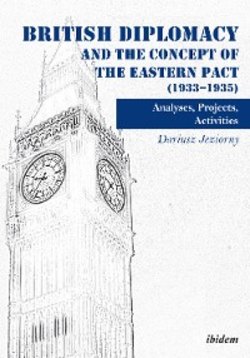Читать книгу British Diplomacy and the Concept of the Eastern Pact (1933-1935) - Dariusz Jeziorny - Страница 3
ОглавлениеContents
INTRODUCTION
CHAPTER 1 From Fear to Partial Acceptance. British Approach to Collective Security (1919–1933)
CHAPTER 2 Turning Point in the Moscow–Berlin Relations in the Assessment of British Diplomacy (January 1933–January 1934)
2.1. Foreign Office and the Increasing Soviet-German Conflict in 1933
2.2. In the Face of the Soviet Diplomatic Game Concerning the Baltic States at the Turn of 1933/1934
2.3. Moscow’s Declarations on Collective Security Policy (December 1933–January 1934)
CHAPTER 3 London’s Reactions to the Emergence of the Concept of the “Eastern Locarno” (March–July 1934)
3.1. The International Context of the Franco-Soviet Initiative in the Assessment of the Foreign Office
3.2 British Opinions on the Reports of the Soviet Plans to Join the League of Nations
3.3. The Foreign Office Reaction to the French Declaration of Extending the Locarno System in East Central Europe (May–June 1934)
3.4. Analysis of the French Project of 27 June 1934
CHAPTER 4 British Diplomatic Efforts for the Accession of the Soviet Union to the Collective Security System (July-September 1934)
4.1. Louis Barthou’s Visit in London (9–10 July 1934)
4.2. The Activity of the Foreign Office for the Conclusion of the Eastern Pact
4.3. Slowdown in the Activities of the British Diplomacy
4.4. In View of the Rejection of the Concept of the Eastern Pact of Mutual Assistance by the Third Reich and Poland
4.5. Great Britain and the Accession of the USSR to the League of Nations
CHAPTER 5 Impasse in Negotiations on the Eastern Pact after the Death of Louis Barthou (October 1934–February 1935)
5.1. International and Internal Conditions of the British Government’s Foreign Policy at the Turn of 1934 and 1935
5.2. Foreign Office and the Paris–Moscow–Berlin Triangle (October–December 1934)
5.3. Assessment of the Political Activity of the USSR at the Turn of 1934/1935
5.4. Foreign Office and the Diplomatic Activity of Pierre Laval in the European Arena (December 1934–January 1935)
5.5. The London Visit of Pierre-Étienne Flandin and Pierre Laval (1-3 February 1935)
CHAPTER 6 Negotiations on the Concept of the Eastern Pact of Non-Aggression and Consultation (February–April 1935)
6.1. Formulating a New Concept of the Eastern Pact
6.2. Hopes Associated with the Visit of British Ministers in Berlin
6.3. Anthony Eden’s Talks in Moscow
6.4. Sounding of the New Concept of the Eastern Pact in Warsaw and Prague
6.5. Eastern Pact at the Conference in Stresa (11-14 April 1935)
CHAPTER 7 Epilogue of British Efforts for the Conclusion of the Eastern Pact (April–November 1935)
7.1. Foreign Office and the Franco-Soviet Pact of Mutual Assistance of 2 May 1935
7.2. Final Efforts for the Eastern Pact of Non-Aggression and Consultation
7.3. London’s Resignation from Promoting the Concept of the Eastern Pact
CONCLUSION
BIBLIOGRAPHY
ANNEX
A1. DICTIONARY OF PERSONS APPEARING IN THE BOOK
A2. STRUCTURE OF THE FOREIGN OFFICE IN 1933–1935
A3. ABBREVIATIONS
Copyright
